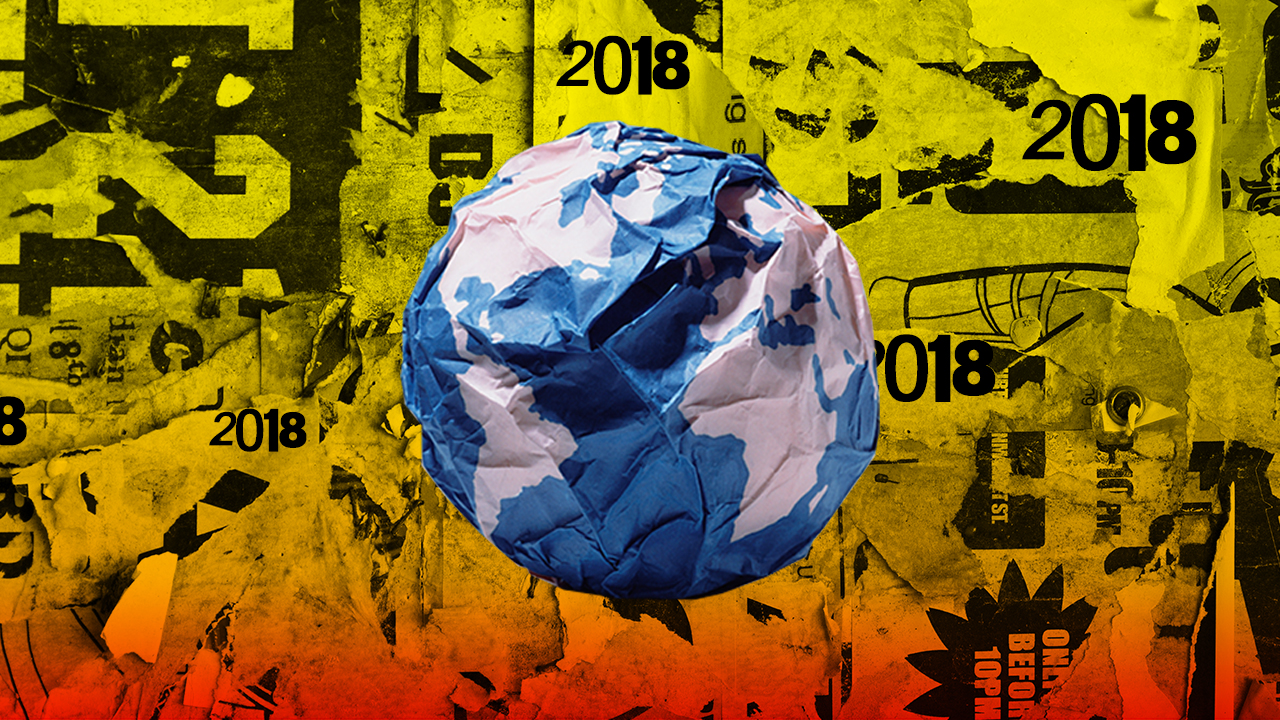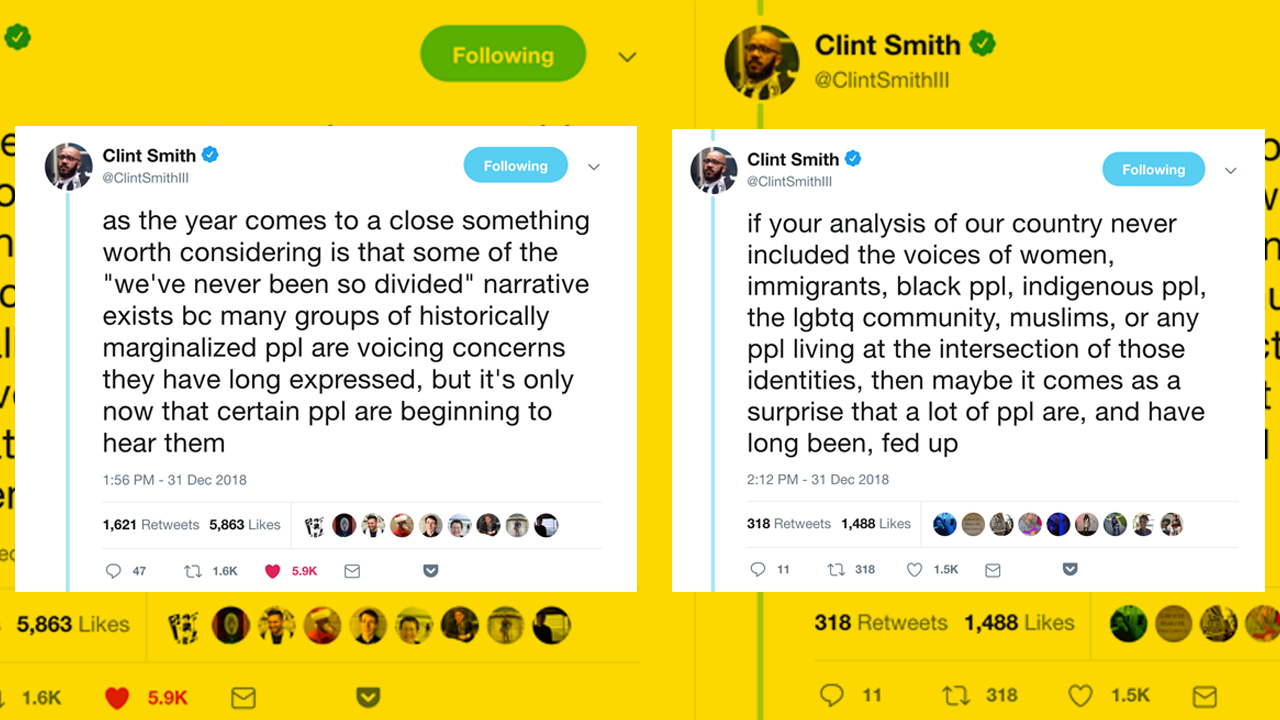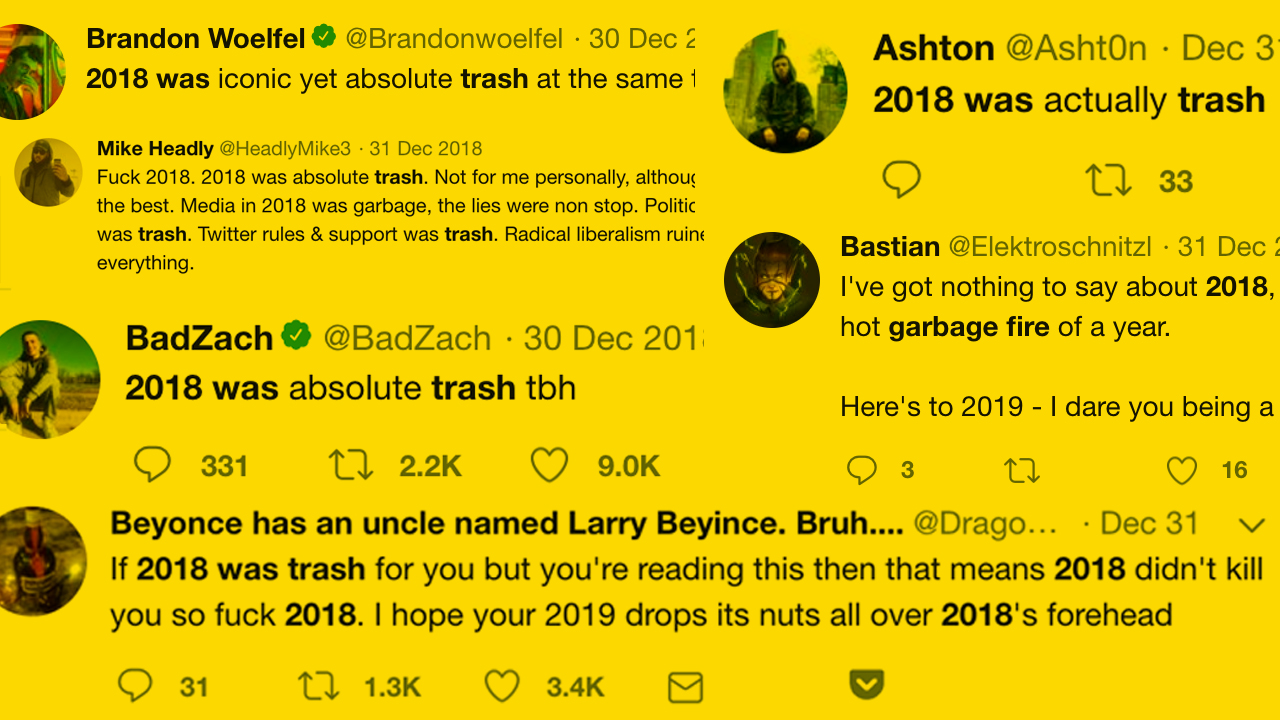
Ever since the final days of 2016 — little more than a month after Donald Trump was elected to the highest office in the land — political pundits, influential voices, and social media stars have taken to dubbing individual years, the world at large, and all of humanity “trash.” They haven’t been deprived of solid reasons for drawing this conclusion, either. The past three years have seen kids in cages, sexual violence exposed across every segment of society, and an ecological doomsday warning. (These examples are limited by the rule of three, I could offer many, many more.)
It’s no surprise then that everyone wants to talk about how awful the planet is, how we’re headed towards extinction, how the invisible monsters from Bird Box are going to visit earth and decide to skip right over us because we’re doing a fine job destroying ourselves without them. But while connecting via our shared sense of societal malaise certainly makes sense (and has become an intrinsic part of social media’s right and left wing factions, Twitter in particular), it’s worth asking: Is everything really so awful? Is there any case to be made for optimism?
If you have any faith in statistics, the answer to those questions are “no” and “yes.” Speaking globally, by virtually every metric available, the overall experience of humans living on earth is steadily progressing. Extreme poverty is plummeting; so is infant mortality. Secondary education rates are at their highest ever; illiteracy has hit an all-time low. Fewer people starve; more people live long lives. The number of wars and dictators are trending downward; the number of people living under democracy is headed up.
And yet… few people seem to think life is getting better. Roughly 6% of Americans take that view and we’re in the middle of the pack worldwide. Which begs a few major questions: Why do so many believe that everything trash? If it’s not trash, why do we insist on holding that position? And, most importantly, is there room for optimism in our current dialogue?
The idea that things are better than we’re willing to admit has been posited before, most notably by Harvard Professor Steven Pinker, in his books Enlightenment Now and Better Angels of Our Nature and a very viral TED Talk. Pinker’s basic thesis is an extrapolation and expansion of the data points listed above. His work revolves around the idea that things are, in fact, less trash than they were 30 years ago. As a public figure, he’s optimistic, smiling, and has supreme faith in the universe’s slow arc toward justice. Bob Ross for intellectuals. Like so many other people making the case for our collective optimism, he’s also white, financially secure, and blessed with a superb pension.
In Pinker’s TED talk and books, he unpacks how the very idea that everything is a cesspool is short-sighted and often media-driven. He urges us to look beyond the splashy headlines at the big picture, where — he promises — progress abounds. The media aspect of this argument is undeniable. Negative stories click. Outrage is a better seller than sex. And though Trump has co-opted the term “fake news” and permanently muddled its meaning, the fact that every outlet on earth uses the most sensational possible take on every single story while crafting headlines in order to compete desperately for your click has certainly contributed to our constant state of collective anxiety. (As Parker Molloy notes, Trump boosted online media because he’s the easiest rage click in the business but he’s also advanced its collapse because he’s sparked fast and loose journalistic practices.)
So is that it? Is everything awesome and we’re just miserable because the media tells us to be? The stories we see are real, after all. There are school shootings. Species are going extinct. We do have children dying in government captivity at our borders. Shitty stuff happens every day, so it’s natural that we react — especially in a country where agnostic humanism is on the rise. (With no rapture to look forward to it’s a lot harder to tolerate misery in this life.)
Pinker seems to vaguely understand all of this. In fact, he says in his TED talk, “Progress does not mean that everything becomes better for everyone, everywhere, all the time.” But he wants us to take the 1000 yard view and see the statistically less awful forest for the historically atrocious trees. It’s a tall order for people staggering under the weight of loans or institutional bigotry. How can you ask those concerned with justice to believe that things are getting better just months after the Kavanaugh hearings? Or Trayvon Martin, Alton Sterling, and Philando Castile? Or what about wage stagnation? Even the lowest unemployment rate in 50 years is unable to charm us when we have to hustle 60 hours a week to cover rent.
On top of all this, the internet in general and social media in specific have made gathering bad news tremendously easy. And while our increasing access to information could deliver “good news” to our fingertips too, it typically doesn’t (Upworthy is the now-mostly-defunct outlier here).

The “everything is trash” concept is closely related to the notion that America is divided. A president who literally never seems to err on the side of human compassion certainly doesn’t help. But the belief that we live in a fractured democracy — the one thing upon which all Americans seem to agree — is built on troubling false assumptions.
Donald Trump and his acolytes seem to believe that there was a time when America was great and the nation was united. This is blatantly fictitious, predicated on willful ignorance of millions and millions of marginalized people. It’s based on a belief that information you’ve turned a blind eye to ceases to exist. When a white, straight male says that we’re divided what he’s actually identifying is people of other races, gender-identities, and sexual orientations finding their respective voices and using them to speak truth to power. The only thing truly being divided in this case is his once whole and wholly false feeling of supremacy.
It’s similarly hard to imagine that thought leaders on the left truly believe that the chasms between us are wider than ever. Divided? Absolutely. More divided? To suggest as much would be to ignore history. The newly sworn-in House and Senate are more diverse than they’ve ever been. Transgender acceptance is skyrocketing. Top tier female and non-white workers are rapidly closing in on the incomes of top-tier white males (though the fact that the black-white wage gap is increasing is deeply troubling). The government historically lags well behind social movements and yet birth certificates are going gender neutral, same-sex marriage is legal in every state, and cannabis prohibition is coming to an abrupt end.
For left or right-leaning stat-lovers, it would be easier to make a statistical case that we’re less divided than ever. Or that we’re equally divided and that — thanks to Trump’s uncanny ability to highlight and amplify extant divisions — we’re just far more aware of what separates us now.

It’s interesting to note that much of the “everything is trash” conversation is born on Twitter. The platform is the most rapid-fire in all of social media. It’s also the most egalitarian (Instagram favors the beautiful; Facebook favors the paying). For all of its flaws, it’s been intrinsic in giving an easy-to-amplify voice to traditionally marginalized people. Voices for whom the world is, statistically speaking, more trashy than their white, cis, male, straight, able-bodied counterparts. In light of this, the fact that we have new, diverse voices entering the broader dialogue is, in and of itself, a sign of progress.
***
So what’s the right answer? Is everything a mess or are we on the right path? Should we rejoice or despair?
It’s worth considering a whole new read on the seeming bleakness of our current social-political moment. Maybe the massive dissatisfaction people have with society doesn’t reject the notion that we’re making progress (and isn’t particularly fatalistic), it’s just a call to action. Sure, things are improving. That’s implied. To call everything trash is simply a reflection of the fact that in our age — when information is readily available — even the steady progress that Pinker alludes to is too slow for any sort of comfort. We want more growth, more equality, more progress, we want to save the planet before it turns into a boiling vat of acid, and we want it all now. Good for us. Three cheers for our ambition.
In that light, a sense of urgency is a good thing. Dissatisfaction and dissent are why people take a knee or take to the streets. And those actions are making a difference.
Maybe the discontent of the young, equality-loving, forward-thinking, socially-progressive, social-media-using masses isn’t actually related to despair at all. Maybe it’s just an outgrowth of our ambition for the world. Maybe it’s the rallying cry of voices who are vaguely aware that things are (generally) getting better but still steadfast that we can and should expect progress to rocket forward ever faster.
If that’s the case, bring on the trash talk. Let’s use it to build something wonderful.
